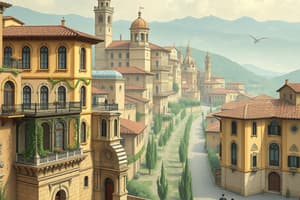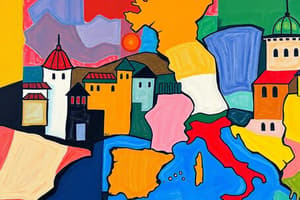Podcast
Questions and Answers
What action did the Florentines take against the Medici in 1494?
What action did the Florentines take against the Medici in 1494?
- Formed an alliance with them
- Supported their return
- Executed all Medici family members
- Drove the Medici from power (correct)
What significant event occurred in February 1497 under Savonarola's influence?
What significant event occurred in February 1497 under Savonarola's influence?
- The Pope excommunicated Savonarola
- Florentines declared war on France
- The Bonfires of the Vanities took place (correct)
- The Medici were restored to power
Which family was driven out of Rome by Pope Julius II in 1503?
Which family was driven out of Rome by Pope Julius II in 1503?
- The Borgia family (correct)
- The Sforza family
- The Aragon family
- The Medici family
What did Girolamo Savonarola emphasize as essential for Florentines?
What did Girolamo Savonarola emphasize as essential for Florentines?
Which battle marked a significant French victory in Italy in 1512?
Which battle marked a significant French victory in Italy in 1512?
In what year did Charles VIII invade the Italian Peninsula?
In what year did Charles VIII invade the Italian Peninsula?
What happened to Savonarola in 1498?
What happened to Savonarola in 1498?
Who led the troops in battle in 1510 and was an enemy of Pope Alexander VI?
Who led the troops in battle in 1510 and was an enemy of Pope Alexander VI?
Flashcards
Perugia Family Feud
Perugia Family Feud
A conflict between rival families in Perugia in 1441, that led to the execution of 130 members of one faction.
Florentine Response to Charles VIII
Florentine Response to Charles VIII
The Florentine Republic's reaction to Charles VIII's invasion, led by Savonarola, who advocated for moral reform and denounced the excesses of the Church.
Bonfires of the Vanities
Bonfires of the Vanities
A movement led by the Dominican Friar Girolamo Savonarola in Florence, focused on religious piety, moral reform, and denouncing the abuses of the Church, culminating in the burning of luxurious objects.
HRE and France Conflict
HRE and France Conflict
Signup and view all the flashcards
Charles VIII's Invasion
Charles VIII's Invasion
Signup and view all the flashcards
Savonarola's Excommunication
Savonarola's Excommunication
Signup and view all the flashcards
Louis XII's Invasion of Milan
Louis XII's Invasion of Milan
Signup and view all the flashcards
Spanish Conquest of Naples
Spanish Conquest of Naples
Signup and view all the flashcards
Study Notes
Italian City-States Conflicts
- Frequent conflicts between city-states like Florence, Milan, and Venice
- Power struggles between families and factions within the city-states
- Invasions from foreign powers (France, Spain) disrupted trade and commerce
French Invasions
- Charles VIII of France invaded the Italian peninsula in 1494, aiming to control Naples
- The French were initially successful, but were eventually driven out
- Further French invasions and conflicts with the Holy Roman Empire and Spain continued until the 1500s
- Repeated French interventions destabilized the region
Rise and Fall of Medici
- The Medici family, initially powerful merchants and bankers, gained political control of Florence
- They were driven from power, but eventually returned, effectively controlling Florence at different periods
- Demonstrates the shifting power dynamics and conflicts among Italian city-states
Economic Shifts
- Shifting trade routes impacted the Italian city-states' economies
- Ottoman control of key trading routes in the eastern Mediterranean reduced Italian influence
- Shift in economic power to Atlantic countries (Portugal, Spain, England, and Netherlands)
- Rise of manufacturing in other areas
- Diversified economies with smaller-scale manufacturing emerged in some places
Machiavelli's Impact
- Niccolò Machiavelli, a Florentine political philosopher, analyzed the nature of power and politics
- His work, The Prince, advocated for political realism and the use of force as necessary
- He observed that constant warfare and conflict was part of life
- Machiavelli saw human nature as inherently aggressive
- He looked to classical Greece/Rome as a guide in how to govern
- He emphasized the importance of human agency in politics/governing
Studying That Suits You
Use AI to generate personalized quizzes and flashcards to suit your learning preferences.




